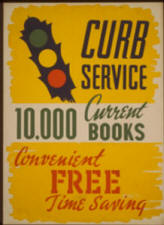A Library for the 99%
 In
2011, while public schools suffered another round of flat or
shrinking budgets, private university endowments grew over 19%.
This year, federal cuts and fee hikes at public colleges and
universities have made this disparity even worse. Governor
Patrick has mitigated some of the misery by refusing to slash
education spending― at least for now. Still, the
ever-increasing gap between public and private schools in
Massachusetts invites the revival of a measure that
lawmakers floated in 2008: imposing a fee on educational endowments
that exceed $1 billion.
In
2011, while public schools suffered another round of flat or
shrinking budgets, private university endowments grew over 19%.
This year, federal cuts and fee hikes at public colleges and
universities have made this disparity even worse. Governor
Patrick has mitigated some of the misery by refusing to slash
education spending― at least for now. Still, the
ever-increasing gap between public and private schools in
Massachusetts invites the revival of a measure that
lawmakers floated in 2008: imposing a fee on educational endowments
that exceed $1 billion.
Despite strong public support, the idea went to the cemetery known
as “further study,” partly because it seemed like a thoughtless grab
for cash. This fate could have been avoided if we had taken
two simple steps, namely, setting the fee low enough to silence
objections from the miserly elite and specifying that the revenue
would be devoted exclusively to education.
So
here’s a proposal that would benefit the few as much as the many,
students at Williams as much as those at Bunker Hill: let’s charge a
0.1% fee to billion+ endowments to fund the creation of a public
digital library that would service educational institutions across
the Commonwealth. This tiny fee wouldn’t deliver the windfall
imagined back when endowments were ascending into the stratosphere.
However, the $50+ million that could be raised annually from the
private schools that have prospered most on public charity would be
plenty to develop and maintain digital archives, courseware, and
educational programs that could reach into every classroom,
including those at the eight institutions whose endowments currently
exceed $1 billion: Amherst, Boston College, Harvard, MIT, Smith,
Tufts, Wellesley, and Williams.
Gaining access to expanding collections of e-books, primary
documents, and multimedia resources would more than offset the
charge to ultra-rich institutions. But a truly
significant change would be felt by downscale students who have
never seen the educational wonders enjoyed by their upscale
counterparts. Yes, a few private universities have increased
public access to digital resources, but while outsiders can find
course materials at MIT, and Harvard permits us to view selections
from its unparalleled collections, anyone seeking equal access to
educational content on the web sites of these and other private
schools soon confronts a demand for an institutional I.D.
People who believe that these schools have every right to hoard
their assets should remember that most of them were supported
directly by the public for decades. Harvard, MIT, and Williams
were, for example, originally established with public funds, and
when their present status as charitable institutions was debated in
the early twentieth century, lawmakers exempted them from taxes for
two reasons: A) the state had no other way to promote higher
education B) private colleges could not generate enough revenue to
sustain themselves without government help.
 Legislators
did not foresee the advent of our public college and university
system, and, of course, they never dreamed that the richest
endowments add up to over $50 billion, as they do now. Still,
it can be argued that, like other charitable institutions, these
schools deserve their tax-exempt status because they promote a
public good. However, this good is not the elevation of a
select group of students. Instead, it’s the promotion of higher
education in general, a purpose that is supposed to benefit everyone
in Massachusetts. As Charles W. Eliot, President of Harvard College,
testified before the Legislature in 1906, endowments should not
be taxed because they are “gifts ‘to a general public use, which
extends to the poor as well as the rich,’ to quote Lord Camden’s
definition of a charity;” and thus, “it is the public which is the
real enjoyer of all such property.” If we accept Eliot’s
rationale, it’s plain that supporting a public digital library would
let wealthy schools fulfill their mission more completely by
enabling the public to become “the real enjoyer” of otherwise
private assets.
Legislators
did not foresee the advent of our public college and university
system, and, of course, they never dreamed that the richest
endowments add up to over $50 billion, as they do now. Still,
it can be argued that, like other charitable institutions, these
schools deserve their tax-exempt status because they promote a
public good. However, this good is not the elevation of a
select group of students. Instead, it’s the promotion of higher
education in general, a purpose that is supposed to benefit everyone
in Massachusetts. As Charles W. Eliot, President of Harvard College,
testified before the Legislature in 1906, endowments should not
be taxed because they are “gifts ‘to a general public use, which
extends to the poor as well as the rich,’ to quote Lord Camden’s
definition of a charity;” and thus, “it is the public which is the
real enjoyer of all such property.” If we accept Eliot’s
rationale, it’s plain that supporting a public digital library would
let wealthy schools fulfill their mission more completely by
enabling the public to become “the real enjoyer” of otherwise
private assets.
Despite double-digit growth, some billion+ schools might complain
that 0.1% is too much to give to the public, that is, to the people
who have handed them massive tax breaks for so long. But if
they won’t honor the commitment that gave them charity status, then
why should we extend the special treatment that allowed them to
amass such astonishing wealth?
Learn more at
http://www.facebook.com/MassDigitalLibrary.
Sample page of multimedia curricular materials (rough draft)